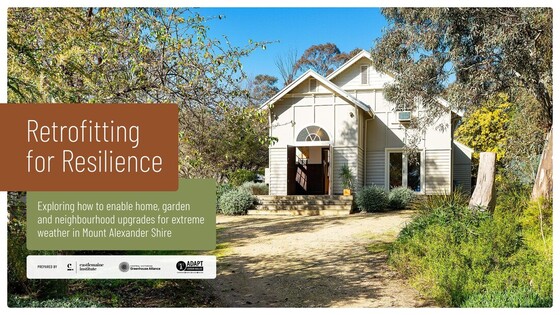Retrofitting for Resilience Research Project

Project status: complete (June 2023)
The Central Victorian Greenhouse Alliance partnered with the Castlemaine Institute on this 12-month research project to understand the barriers and identify practical options for households in the Loddon Mallee region to upgrade their homes and properties to be more resilient to climate-related extreme events. The project was funded by Loddon Mallee Adapt, a program of the Victorian Government Department of Energy, Environment and Climate Action.
This project focused on Mount Alexander Shire as a case study site that is broadly representative of housing typologies across the Loddon Mallee region. Through a desktop study and community-based research activities the project:
Much of the region's housing stock, particularly houses built before 1991, has not been designed or constructed to withstand projected increases in temperatures and extreme weather under climate change. Many houses in the Loddon Mallee region have suffered damage due to extreme events such as bushfires, floods, and storms. Heatwaves and cold snaps also pose health risks to residents living in older homes. Retrofitting existing homes to enhance climate resilience can benefit residents by improving overall liveability, health and wellbeing outcomes, and reducing costs associated with property damage, higher insurance premiums, and year-round heating and cooling.
Households face a range of barriers to upgrading their homes, from access to relevant information and advice, to costs and other financial barriers, and the availability of local trades. But there are a range of simple upgrades that households can undertake to prepare for extreme events and improve the resilience of their home. A guide has been developed through the project to help households to assess their homes and identify prioirty upgrades. Learn more about this guide here.
A Final Project Report is now available and can be downloaded at the link below.
The authors would like to that the Policy and Community Reference Groups, household and key informant interview participants, and the University of Melbourne’s Community Engagement for Disaster Risk Reduction project team for their contributions to this research.
The Central Victorian Greenhouse Alliance partnered with the Castlemaine Institute on this 12-month research project to understand the barriers and identify practical options for households in the Loddon Mallee region to upgrade their homes and properties to be more resilient to climate-related extreme events. The project was funded by Loddon Mallee Adapt, a program of the Victorian Government Department of Energy, Environment and Climate Action.
This project focused on Mount Alexander Shire as a case study site that is broadly representative of housing typologies across the Loddon Mallee region. Through a desktop study and community-based research activities the project:
- Explored lived experience, knowledge and awareness of climate-related risks, household exposure, and home adaptation options;
- Identified the resources, services, and incentives that are available (or needed) for residents to retrofit their homes; and
- Developed recommendations for local and state government to encourage and enable residents to implement home adaptation solutions.
Much of the region's housing stock, particularly houses built before 1991, has not been designed or constructed to withstand projected increases in temperatures and extreme weather under climate change. Many houses in the Loddon Mallee region have suffered damage due to extreme events such as bushfires, floods, and storms. Heatwaves and cold snaps also pose health risks to residents living in older homes. Retrofitting existing homes to enhance climate resilience can benefit residents by improving overall liveability, health and wellbeing outcomes, and reducing costs associated with property damage, higher insurance premiums, and year-round heating and cooling.
Households face a range of barriers to upgrading their homes, from access to relevant information and advice, to costs and other financial barriers, and the availability of local trades. But there are a range of simple upgrades that households can undertake to prepare for extreme events and improve the resilience of their home. A guide has been developed through the project to help households to assess their homes and identify prioirty upgrades. Learn more about this guide here.
A Final Project Report is now available and can be downloaded at the link below.
The authors would like to that the Policy and Community Reference Groups, household and key informant interview participants, and the University of Melbourne’s Community Engagement for Disaster Risk Reduction project team for their contributions to this research.
